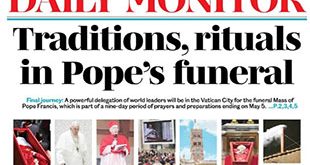
Kampala, Uganda | THE INDEPENDENT | The Uganda Episcopal Conference says that if the government is serious about salvaging the education system, there is a need to either stop or heavily regulate the ongoing commercialization of education.
The assembly of Catholic bishops, made this observation through its education commission which was presenting it’s memoranda to the Nuwe Amanya Mushega led Education Policy Review Commission.
Rt. Rev. Sanctus Lino Wanok, the newly elected vice chairperson of the conference talking on behalf of the bishops, noted that the heavy commercialization in the sector is responsible for the majority of shortcomings that are driving the system in abyss.
Bishop Wanok, who is also the ordinary of Lira Diocese, added that the education sector is the heart beat of the country and needed to be carefully handled rather than letting every tom dick and harry to see it just as another business where they do what they wish.
He added the development has severely hindered the improvement of educational values, reduced teaching quality, and has brought heavy pressure to students as schools seize results out of them, which all directly hinders the healthy development of the sector.
In the 1990s, Uganda liberalized the education sector thus attracting all manner of investors. While liberalization of the education sector has been seen as a good idea, the government is blamed for failing to put in place proper regulation mechanisms to ensure fair play and quality.
Although to a smaller extent the competition from providers of education has led to better quality, there are several complaints of inadequate regulation of private education providers who seem more interested in profit making than good quality.
Rev. Fr. Ronald Okello, the executive secretary in charge of education at the catholic secretaries also observed that with the ongoing commercialisation, schools are now examination orientated as the performance in national examination is now seen as the bench mark of the best school.
“All what they do is focus on the end result of minting more money rather than the desired competencies. Unexamined subjects which are critical to the life of an individual are not given time. Many put pressure on the learners for them to pass so as to attract more clients,” said Fr. Okello.
Although the catholic church is criticizing and complaining about development, commercialization has not spared their own institutions. For instance, there has been a growing concern from the faithfuls that church schools are exorbitantly expensive.
During the meeting, Amanya Mushega also pointed the gun to the church on several practices which are money centred rather than handling education as a service. Mushega who squarely agreed with the concerns of the church leaders politely stated that many church schools are known for sending away what they call daft students in a bid to remain with those whose performance will attract more learners.
Meanwhile, the church also resounded its stand on sexuality education in schools warning that the government should not be misled by the interests of western donors. Rt. Rev. Raphael p’Mony Wokorach, Bishop of Nebbi, noted the church is not against teaching sex education but it is rather concerned about how the subject is packaged.
Wokorach, who is the newly elected chairperson of the education commission at the catholic secretariat, said there still very many unanswered questions on how the proposed framework will be implemented and monitored.
Other issues raised by the church included regulation of school fees for both public and private institutions, provision of secondary education to all Uganda to enhance equal opportunities and imposing vocational education among others.
*****
URN
 The Independent Uganda: You get the Truth we Pay the Price
The Independent Uganda: You get the Truth we Pay the Price



